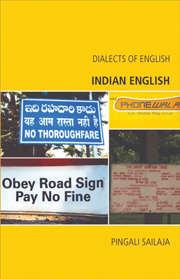Book contents
- Frontmatter
- Contents
- Preface
- Acknowledgements
- Abbreviations, Symbols and other Notational Conventions Used
- 1 Introduction
- 2 Phonetics and Phonology
- 3 Morphosyntax
- 4 Lexis and Discourse
- 5 History and Changes in Progress
- 6 Survey of Previous Work and Annotated Bibliography
- 7 Sample Texts
- Bibliography of Cited Works
- Index
5 - History and Changes in Progress
Published online by Cambridge University Press: 05 August 2013
- Frontmatter
- Contents
- Preface
- Acknowledgements
- Abbreviations, Symbols and other Notational Conventions Used
- 1 Introduction
- 2 Phonetics and Phonology
- 3 Morphosyntax
- 4 Lexis and Discourse
- 5 History and Changes in Progress
- 6 Survey of Previous Work and Annotated Bibliography
- 7 Sample Texts
- Bibliography of Cited Works
- Index
Summary
Thomas Babington Macaulay's historic ‘Minute’ on Indian Education of 2 February 1835 is generally perceived to be the starting point of English education in India. While this is correct, it is true in a particular sense. Macaulay's ‘Minute’ was instrumental in establishing English as the medium of instruction in educational institutions of higher learning. But, even prior to this institutionalisation, there were attempts at English education in India by several independent and other organisations. The first serious forays into India by Englishmen began with the establishment of the East India Company by the granting of a charter by Queen Elizabeth I, to a few merchants of the City of London, giving them monopoly of trade with the East, on 31 December 1600. By 1611, British factories began to be established in different coastal places in India. Over two centuries of contact with the British was obviously going to have an impact on the language situation of the country. The events relating to language cannot be divorced from the politico-historical, cultural and religious factors that shape a nation. This chapter will trace some of the significant events that contributed to the establishment of English in India. Since India is a vast, populous country, many areas will perforce be left out of the picture in this short space. The focus will remain on the three Presidencies-Madras, Calcutta and Bombay. It should be remembered that independence in 1947 was accompanied by the vivisection of India into what are now three countries.
- Type
- Chapter
- Information
- Indian English , pp. 95 - 119Publisher: Edinburgh University PressPrint publication year: 2009

